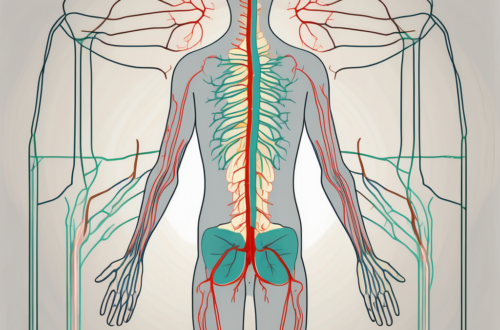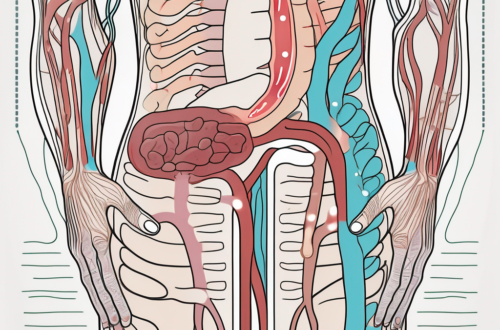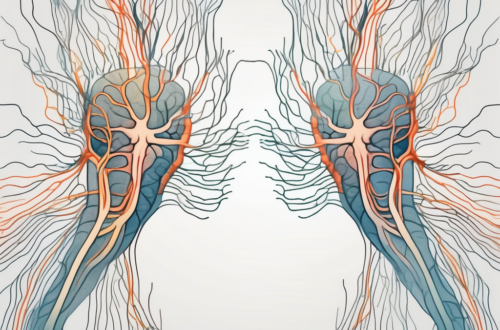The parasympathetic nervous system plays a crucial role in regulating digestive actions. By understanding the intricate connection between nerve impulses and digestion, we can appreciate the impact that parasympathetic nerve impulses have on our digestive system and overall health.
Understanding the Parasympathetic Nervous System
The parasympathetic nervous system is one of the two divisions of the autonomic nervous system, responsible for maintaining homeostasis in the body. Its main function is to conserve and restore energy, promoting relaxation and digestion. Unlike its counterpart, the sympathetic nervous system, which prepares the body for a fight-or-flight response, the parasympathetic nervous system calms the body down and allows it to rest and digest.
The parasympathetic nervous system consists of cranial nerves originating from the brain and spinal nerves emerging from the lower part of the spinal cord. These nerves send electrical signals, known as nerve impulses, to various organs and tissues throughout the body.
When it comes to understanding the parasympathetic nervous system, it is important to delve deeper into its role and functions.
The Role of the Parasympathetic Nervous System
The primary role of the parasympathetic nervous system is to regulate and control automatic bodily functions, including digestion. When activated, it stimulates the secretion of digestive enzymes, increases blood flow to the digestive organs, and enhances gut motility. This allows for efficient breakdown and absorption of nutrients from the food we consume.
Furthermore, the parasympathetic nervous system plays a pivotal role in maintaining optimal digestive health by balancing the activity of the digestive organs, such as the stomach and intestines. It ensures that the digestive process proceeds smoothly without any disruptions.
In addition to its role in digestion, the parasympathetic nervous system also influences other bodily functions. It helps regulate heart rate, promoting a slower and more regular rhythm. It also plays a role in controlling pupil constriction, salivation, and lacrimation (tear production).
Moreover, the parasympathetic nervous system is involved in sexual arousal and reproduction. It promotes the release of nitric oxide, which leads to the relaxation of blood vessels in the genital region, allowing for increased blood flow and engorgement.
Parasympathetic Nervous System vs. Sympathetic Nervous System
To better understand the impact of parasympathetic nerve impulses on digestive actions, it is important to compare it to the sympathetic nervous system. While the parasympathetic branch promotes digestion, the sympathetic branch inhibits it. During times of stress or danger, the sympathetic nervous system takes over, diverting resources away from digestion and towards the muscles, preparing the body for fight or flight.
Therefore, the parasympathetic nervous system’s activation is essential for effective and efficient digestive actions, as it counteracts the inhibitory effects of the sympathetic nervous system and helps the body achieve a state of relaxation necessary for digestion.
It is worth noting that the balance between the parasympathetic and sympathetic nervous systems is crucial for overall well-being. An imbalance in their activities can lead to various health issues. For example, an overactive sympathetic nervous system can result in chronic stress, anxiety, and digestive disorders, while an underactive parasympathetic nervous system can lead to sluggish digestion and poor nutrient absorption.
Therefore, maintaining a healthy lifestyle, managing stress levels, and engaging in relaxation techniques such as deep breathing, meditation, and yoga can help support the optimal functioning of the parasympathetic nervous system and promote overall well-being.
The Connection Between Nerve Impulses and Digestion
Nerve impulses are electrical signals that travel along neurons, enabling communication between different parts of the body. Within the digestive system, nerve impulses play a crucial role in coordinating and regulating various digestive processes.
The Process of Nerve Impulses
Nerve impulses begin with the initiation of an electrical signal within the neurons. When a stimulus is received, such as the presence of food in the digestive tract, specialized receptors within the gastrointestinal lining detect it and transmit signals to the brain via the parasympathetic nervous system.
Once the brain receives these signals, it processes the information and sends appropriate instructions back to the digestive organs via the parasympathetic nerves. These instructions modulate the secretion of digestive enzymes, regulate blood flow, and enhance motility, facilitating the efficient breakdown and absorption of nutrients.
The process of nerve impulses is highly intricate and involves a complex network of neurons. When a stimulus is detected in the digestive system, the receptors in the gastrointestinal lining send signals to the enteric nervous system, which is often referred to as the “second brain” of the body. This intricate network of neurons is responsible for coordinating the various functions of the digestive system, including the secretion of digestive enzymes, the contraction and relaxation of the smooth muscles, and the regulation of hormone release.
Within the enteric nervous system, there are two main divisions: the myenteric plexus and the submucosal plexus. The myenteric plexus is responsible for regulating the movement and contraction of the muscles in the digestive tract, ensuring the smooth flow of food through the system. The submucosal plexus, on the other hand, controls the secretion of digestive enzymes and hormones, facilitating the breakdown and absorption of nutrients.
How Nerve Impulses Influence Digestion
Nerve impulses have a profound influence on the entire digestive process. They stimulate the release of enzymes and gastric acid, which aid in the breakdown of food particles into smaller, more absorbable components. Additionally, nerve impulses enhance the coordinated contraction and relaxation of the smooth muscles that line the digestive tract, promoting movement of food along the digestive system.
Moreover, nerve impulses regulate the secretion of hormones involved in digestion, such as gastrin and cholecystokinin, which help regulate stomach emptying, bile release, and pancreatic enzyme secretion.
Furthermore, the connection between nerve impulses and digestion extends beyond the physical processes. Research has shown that the brain-gut axis, the bidirectional communication between the brain and the gut, plays a significant role in digestion. Stress, emotions, and psychological factors can influence the release of nerve impulses in the digestive system, leading to changes in digestion and gastrointestinal symptoms.
For example, when a person experiences stress or anxiety, the brain sends signals to the digestive system that can result in decreased blood flow, reduced secretion of digestive enzymes, and altered motility. These changes can lead to symptoms such as indigestion, bloating, and abdominal discomfort.
Understanding the connection between nerve impulses and digestion is essential for maintaining optimal digestive health. By promoting a healthy balance in the nervous system and managing stress levels, individuals can support the proper functioning of their digestive system and improve overall well-being.
Parasympathetic Nerve Impulses and Digestive Actions
The impact of parasympathetic nerve impulses on digestive actions can be observed at various levels within the digestive system, from the stomach to the intestines.
When it comes to the digestive system, the parasympathetic nervous system is like the conductor of a symphony, orchestrating a series of complex actions that ensure optimal digestion and nutrient absorption. Let’s take a closer look at how parasympathetic nerve impulses influence stomach function and intestinal activity.
The Impact of Parasympathetic Nerve Impulses on Stomach Function
Parasympathetic nerve impulses stimulate the release of gastric acid and digestive enzymes in the stomach, promoting optimal digestion. These powerful substances break down food into smaller particles, allowing for easier absorption of nutrients.
But that’s not all. Parasympathetic nerve impulses also increase blood flow to the stomach, ensuring that the gastric lining remains healthy and well-nourished. This is crucial for maintaining the integrity of the stomach and preventing the development of ulcers or other gastrointestinal issues.
Furthermore, parasympathetic activation triggers peristaltic contractions, which mix and churn food within the stomach. Imagine a gentle wave moving through the stomach, breaking down food into even smaller pieces. This process, known as mechanical digestion, aids in further breakdown and digestion.
These coordinated contractions allow for the gradual release of partially digested food, known as chyme, into the small intestine. Without the parasympathetic nerve impulses, the stomach would not be able to efficiently break down food and prepare it for further digestion and absorption.
Parasympathetic Nerve Impulses and Intestinal Activity
As food enters the small intestine, parasympathetic nerve impulses continue to play a crucial role in digestion. They stimulate the release of pancreatic enzymes, bile, and intestinal enzymes, which are essential for breaking down carbohydrates, proteins, and fats.
Imagine the small intestine as a bustling marketplace, with various vendors (enzymes) working together to break down food into its smallest components. The parasympathetic nervous system ensures that these vendors are well-equipped and ready to carry out their tasks efficiently.
But the parasympathetic nervous system doesn’t stop there. It also regulates the coordinated contractions of the intestinal smooth muscles, promoting peristalsis. Peristalsis is like a gentle massage for the intestines, propelling the digested food along its journey and facilitating the absorption of nutrients.
This coordinated movement allows for efficient nutrient absorption and the elimination of waste products. Without the parasympathetic nerve impulses, the small intestine would struggle to effectively digest and absorb nutrients, leading to malnutrition and other digestive complications.
So, the next time you enjoy a delicious meal, take a moment to appreciate the intricate dance between parasympathetic nerve impulses and your digestive system. It’s a symphony of actions that ensures your body receives the nourishment it needs to thrive.
The Effects of Parasympathetic Nerve Impulses on Digestive Health
Maintaining optimal digestive health is crucial for overall well-being, and parasympathetic nerve impulses play a significant role in achieving this.
The parasympathetic nervous system, often referred to as the “rest and digest” system, is responsible for promoting digestion and nutrient absorption. It counterbalances the sympathetic nervous system, which is responsible for the body’s “fight or flight” response. When the parasympathetic nervous system is activated, it stimulates various digestive processes, ensuring that our bodies efficiently break down food and absorb essential nutrients.
Parasympathetic Nerve Impulses and Digestive Disorders
Imbalances or dysfunctions within the parasympathetic nervous system can disrupt the digestive process and lead to various digestive disorders. For example, inadequate parasympathetic stimulation can result in decreased enzyme secretion, impaired intestinal motility, and poor nutrient absorption. This can manifest as symptoms like bloating, constipation, and malnutrition.
On the other hand, excessive parasympathetic activation can lead to excessive gastric acid secretion and increased motility, causing issues such as acid reflux and diarrhea. These conditions can be uncomfortable and may significantly impact an individual’s quality of life.
If you experience any persistent digestive symptoms or suspect an issue with your digestive health, it is important to consult with a healthcare professional who can provide accurate diagnosis and appropriate treatment options tailored to your specific needs. They can help identify the underlying cause of your digestive issues and develop a comprehensive plan to restore balance to your parasympathetic nervous system.
Maintaining Digestive Health: The Role of Parasympathetic Nerve Impulses
Promoting a healthy lifestyle and managing stress levels can positively impact parasympathetic nerve impulses and, consequently, digestive health. Engaging in regular physical activity helps stimulate the parasympathetic nervous system and promotes healthy digestion. Additionally, adopting a balanced diet rich in fiber and nutrients provides the necessary fuel for optimal digestive function.
Practicing relaxation techniques, such as deep breathing and mindfulness, can also support the optimal functioning of the parasympathetic nervous system. These techniques help reduce stress levels, which can have a direct impact on digestive health. Chronic stress can disrupt the balance between the sympathetic and parasympathetic nervous systems, leading to digestive issues.
However, it is essential to note that maintaining digestive health is a multifactorial process, and individualized approaches may be necessary. Consulting with a healthcare professional can provide personalized guidance and support for optimizing digestive health. They can help create a tailored plan that addresses your unique needs, including dietary modifications, stress management techniques, and potential medical interventions if necessary.
Future Research and Implications
Ongoing research continues to explore the potential therapeutic applications and unanswered questions concerning parasympathetic nerve impulses and their effect on digestive actions. The findings from these studies have the potential to shape future treatments and interventions for individuals with digestive disorders or those seeking to optimize their digestive health.
One area of future research focuses on the potential therapeutic applications of parasympathetic nerve impulses. Understanding the intricate relationship between parasympathetic nerve impulses and digestive actions opens up possibilities for targeted therapeutic interventions. By modulating parasympathetic activity, researchers hope to develop treatments that effectively address various digestive disorders, such as gastroparesis or irritable bowel syndrome. These disorders can significantly impact an individual’s quality of life, causing symptoms such as abdominal pain, bloating, and irregular bowel movements. Therefore, finding effective therapeutic approaches is of utmost importance.
However, more research is still needed to validate these approaches and ensure their safety and efficacy. Clinical trials and longitudinal studies are essential to evaluate the effectiveness of potential therapeutic interventions. Additionally, researchers need to consider individual variations in parasympathetic nerve impulse activity and how they may influence treatment outcomes. By conducting rigorous research, scientists can provide evidence-based recommendations for healthcare professionals and individuals seeking treatment options.
Potential Therapeutic Applications
Understanding the intricate relationship between parasympathetic nerve impulses and digestive actions opens up possibilities for targeted therapeutic interventions. By modulating parasympathetic activity, researchers hope to develop treatments that effectively address various digestive disorders, such as gastroparesis or irritable bowel syndrome.
Gastroparesis is a condition characterized by delayed stomach emptying, leading to symptoms like nausea, vomiting, and early satiety. Current treatments for gastroparesis focus on symptom management, but targeting parasympathetic nerve impulses could offer a more direct and effective approach. By stimulating or inhibiting specific parasympathetic pathways, researchers may be able to regulate gastric motility and improve overall digestive function.
Irritable bowel syndrome (IBS) is another common digestive disorder that affects millions of people worldwide. It is characterized by abdominal pain, bloating, and changes in bowel habits. While the exact cause of IBS remains unknown, dysregulation of the parasympathetic nervous system is believed to play a role. By developing therapies that modulate parasympathetic activity, researchers aim to alleviate symptoms and improve the quality of life for individuals with IBS.
However, more research is still needed to validate these approaches and ensure their safety and efficacy. Clinical trials involving a diverse range of participants are necessary to evaluate the effectiveness of potential therapeutic interventions. Long-term studies are also crucial to assess the sustainability of treatment outcomes and potential side effects.
Unanswered Questions and Future Directions
Despite our current knowledge, numerous questions regarding parasympathetic nerve impulses and their impact on digestive actions remain unanswered. Further research is needed to explore the precise mechanisms by which parasympathetic activation influences specific digestive processes.
One area of interest is the role of parasympathetic nerve impulses in regulating gastric acid secretion. Gastric acid plays a crucial role in the digestion of food and the absorption of nutrients. Understanding how parasympathetic activation influences gastric acid secretion could lead to new insights into the treatment of conditions such as gastroesophageal reflux disease (GERD) and peptic ulcers.
Additionally, investigations into potential interactions between the parasympathetic and sympathetic nervous systems could shed light on the complex interplay between the two divisions and its implications for digestion. The sympathetic nervous system is known to have a counterbalancing effect on the parasympathetic system, regulating various bodily functions. Understanding how these two systems interact and influence digestive actions could provide valuable insights into the development of targeted therapies.
This ongoing research continues to expand our understanding and may provide valuable insights into novel therapeutic approaches. By unraveling the complexities of parasympathetic nerve impulses and their role in digestion, researchers can pave the way for personalized treatments that address the underlying causes of digestive disorders.
In conclusion, parasympathetic nerve impulses play a vital role in regulating digestive actions. By understanding the interconnectedness of nerve impulses, the parasympathetic nervous system, and digestion, we gain insights into the mechanisms underlying digestive health. Ensuring optimal parasympathetic nerve impulse activity and consulting with a healthcare professional when necessary can help individuals maintain a healthy digestive system, supporting overall well-being.





